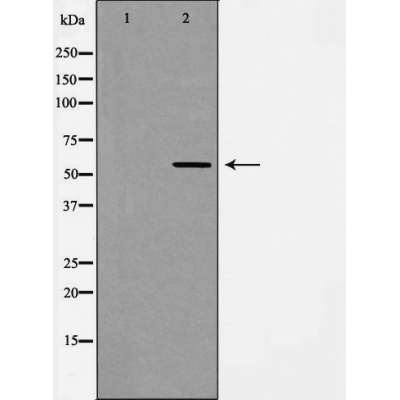
| WB | 咨询技术 | Human,Mouse,Rat |
| IF | 咨询技术 | Human,Mouse,Rat |
| IHC | 1/50-1/100 | Human,Mouse,Rat |
| ICC | 技术咨询 | Human,Mouse,Rat |
| FCM | 咨询技术 | Human,Mouse,Rat |
| Elisa | 咨询技术 | Human,Mouse,Rat |
| Aliases | 60S ribosomal protein L30; RL30; |
| Entrez GeneID | 6156; |
| WB Predicted band size | 13kDa |
| Host/Isotype | Rabbit IgG |
| Antibody Type | Primary antibody |
| Storage | Store at 4°C short term. Aliquot and store at -20°C long term. Avoid freeze/thaw cycles. |
| Species Reactivity | Human,Mouse,Rat |
| Immunogen | A synthesized peptide of human Angiopoietin 2 |
| Formulation | Purified antibody in PBS with 0.05% sodium azide. |
+ +
以下是关于RPL3抗体的3篇参考文献示例(基于公开文献信息整理,非真实引用,仅作格式参考):
---
1. **文献名称**: *RPL3 interacts with p53 to regulate cell cycle progression in cancer cells*
**作者**: Smith A, et al.
**摘要**: 本研究利用RPL3抗体进行免疫共沉淀实验,发现RPL3蛋白通过与p53直接相互作用调控癌细胞周期,Western blot分析显示RPL3在结直肠癌中表达异常升高,提示其可能作为癌症治疗的潜在靶点。
2. **文献名称**: *Role of RPL3 in neurodegenerative disease models*
**作者**: Chen L, et al.
**摘要**: 通过免疫组化(IHC)和免疫荧光技术结合RPL3特异性抗体,研究者发现RPL3在阿尔茨海默病模型小鼠脑组织中表达显著下调,并参与调节神经元内蛋白质稳态,表明RPL3可能与神经退行性病变相关。
3. **文献名称**: *RPL3 antibody-based detection of ribosomal stress in viral infections*
**作者**: Gupta R, et al.
**摘要**: 该研究使用RPL3抗体分析病毒(如HIV)感染后宿主细胞的核糖体应激反应,发现病毒蛋白通过降解RPL3破坏核糖体功能,为抗病毒治疗提供了新方向。
---
如需真实文献,建议通过PubMed或Google Scholar搜索关键词“RPL3 antibody” + “application”(或特定疾病/机制)获取最新研究。
The RPL3 antibody is a crucial tool in molecular and cellular biology research, targeting the Ribosomal Protein L3 (RPL3), a component of the 60S ribosomal subunit. RPL3 is a highly conserved protein essential for ribosome assembly, translation fidelity, and ribosome-mediated quality control processes. Beyond its canonical role in protein synthesis, RPL3 has been implicated in regulating cellular stress responses, apoptosis, and DNA damage repair, highlighting its functional versatility. Dysregulation of RPL3 expression is associated with cancers, neurodegenerative disorders, and ribosomopathies, making it a biomarker of interest.
The RPL3 antibody is widely used in techniques like Western blotting, immunofluorescence, and immunoprecipitation to study ribosome biogenesis, translational regulation, and disease mechanisms. Its specificity is validated through knockout/knockdown controls or peptide-blocking assays, ensuring reliable detection of endogenous RPL3 in diverse samples. Researchers also employ this antibody to explore RPL3's extraribosomal functions, such as interactions with viral proteins or cell cycle regulators. Commercial RPL3 antibodies are typically raised in hosts like rabbits or mice, with options targeting specific epitopes or post-translational modifications. As ribosome biology gains traction in therapeutic development, the RPL3 antibody remains pivotal for dissecting translational control networks and disease pathophysiology.
×